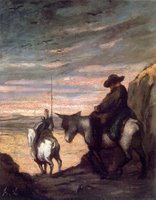Ignatius as the Man of La Mancha
 Last night, I watched Repertory Philippines' production of The Man of La Mancha. I must say that the musical was impressive--from the costumes, the set, the voices to the acting and the production design--a true work of art.
Last night, I watched Repertory Philippines' production of The Man of La Mancha. I must say that the musical was impressive--from the costumes, the set, the voices to the acting and the production design--a true work of art.What moved me in the musical was the uncanny similarity of Don Quixote and his pipe dreams and Ignacio de Loyola and his passion. Both were called mad during their times. Don Quixote battled imaginary giants and invincible foes while Ignacio fought his own devils and demons tormenting him and making his heart captive.
Both of them left their earhtly treasures to pursue their respective ladies. Don Quixote, his Dulcinea; Ignacio, his Madonna della Strada. Both were knights in their own rights. Both loved starring at the starry sky, their eyes fired by vision from within. Both had brushes with the Inquisition. Both dreamt of impossible dreams, bore unbearable sorrows and ran where the brave dared not go.
But one thing differentiates the two: Don Quixote's was a personal quest--probably not for personal glory but nevertheless it was motivated by his personal love for Dulcinea--while Ignacio was pursuing an even madder dream--to conquer souls for God. Ignacio, unlike Quixote, did not "strive with his last ounce of courage to reach the unreachable stars" but left everything to the will of God. He surrendered his dreams and visions and hopes as a final act of submission and humility to the God who called him to form the Society of Jesus, a ragtag army of delusional and sinful men, whose only claim was that they too were loved by God.
And so, the dream lives on...
Don Quixote's oration could very well speak of and for the Society of Jesus:
- When life itself seems lunatic, who knows where madness lies? Perhaps to be too practical may be madness. To surrender dreams, this may be madness. To seek treasures where there is only trash...Too much sanity may be madness, and maddest of all is to see life as it is and not as it should be.



0 Comments:
Post a Comment
<< Home